Powerful for big volunteer teams, but expect a steep learning curve and no admin access on mobile.
Verdict: 7/10
Rosterfy offers a sweet deal if you manage over 500 volunteers and need a full-featured platform. It includes automated scheduling, timesheets, volunteer forms, mass emailing, and more. You can set up advanced automations, and all its tools are highly customizable.
So customizable, in fact, that non-techy admins will struggle. A lot. There are numerous buttons to press, checkboxes to tick, and steps to follow just to set up user groups, recurring shifts, and custom reports. Also, managers who aren’t glued to their desks are doomed—the Rosterfy mobile app has no admin functionality.
Overall, though, I’d say the good outweighs the bad for large nonprofits. Smaller teams, on the other hand, must look for more user-friendly, affordable alternatives.
Key Features:
- Rostering: Create recurring shifts and auto-assign volunteers based on availability, maximum hours, and other factors.
- Time tracking: Let users check in and out of shifts and events, approve timesheets, and set pay rates where relevant.
- Volunteer forms: Create custom forms with visibility rules for advanced questions.
- Communication: Automate branded email messages to volunteers and post news articles.
- Volunteer database: Update user info, track communication history, and more.
- Automation: Customize advanced automations across schedules, training, comms, and more.
Pros
- Cost-effective for large nonprofits (500+ volunteers)
- Extremely customizable
- Features auto-scheduling
Cons
- Unavailable for smaller teams
- Learning curve for non-techy admins
- No admin features on mobile
Rosterfy Pricing
Rosterfy offers custom pricing based on the number of volunteers. You need to book a call with a Rosterfy sales rep to get a quote. Although there’s no free trial, you can book a demo and review the company’s well-explained help articles.
I booked a call with a rep and found out that Rosterfy offers all its features in one plan, but bills in buckets of “X amount” of users. I was quoted two price ranges from the rep, starting with a 500-user minimum.
| Up to 500 volunteers | Up to 1,000 volunteers | |
| Monthly fee (annual billing) | $417–$583 | $667–$834 |
| No. of admins | 10 | |
| Features | Full access: ✅Scheduling ✅Time and attendance ✅Communication ✅Volunteer portal ✅Training ✅Reporting | |
| Implementation fee | Custom price | |
The Rosterfy rep didn’t confirm what factors would determine the exact price within those quoted ranges, but to keep it simple, average the two respective ranges, and you’re looking at about $500/month (up to 500 volunteers) and $750/month (up to 1,000 volunteers). The rep didn’t specify an extra per-user charge.
On-request configurations were quoted at a one-time cost of $4,000–$5,000. Understandably, one user said that “bespoke development can be outside of budget limitations.”
For teams managing hundreds or thousands of volunteers, Rosterfy is pretty affordable. Considering the vendor’s minimum requirement of 500 volunteers, the software costs an average of $500/month, compared to Deputy Premium’s $2,500/month (billed annually).
Still, a more affordable option is VolunteerHub, which includes scheduling, time clock, and messaging for $143/month (billed annually) for up to 1,000 volunteers.
But what if you’re a smaller nonprofit and can’t even get a demo with Rosterfy, let alone afford it? Then small-team-friendly time trackers might suit you. For 50 users, and for similar features to Rosterfy, Deputy Premium charges $250/month, and Connecteam Advanced charges $99/month (billed annually). Plus, both of them offer free-forever plans and free trials.
Here’s a quick comparison.
| Team size | Rosterfy(all features) | VolunteerHub(Plus) | Deputy(Premium) | Connecteam(Advanced) |
|---|---|---|---|---|
| View pricing | View pricing | View pricing | View pricing | |
| 10 Users | $417–$583 | $143 | $50 | Free for life—All features and dashboards |
| 50 Users | $417–$583 | $143 | $250 | $99 |
| 100 Users | $417–$583 | $143 | $500 | $224 |
| 500 users | $417–$583 | $143 | $2,500 | $1,224 |
| Read our full Deputy review | Learn more about Connecteam | |||
| * All prices show the monthly cost when billed annually as of September 2025. | ||||
Verdict: 7.5/10
Rosterfy Usability and Interface
Although I had an initial chat with the sales rep, got a quote, and expressed my interest in Rosterfy’s full set of features, the rep canceled my demo request about a week later, saying only that “our platform may not be a great fit at this time.”
So, I didn’t get to trial or demo Rosterfy. I did the next best thing, though; I examined its website, help center, and demo videos, alongside verified user reviews.
Overall, the navigation looks great. The placement of modules and tools is intuitive, and data (such as volunteer accounts) is neatly laid out in filterable tables.
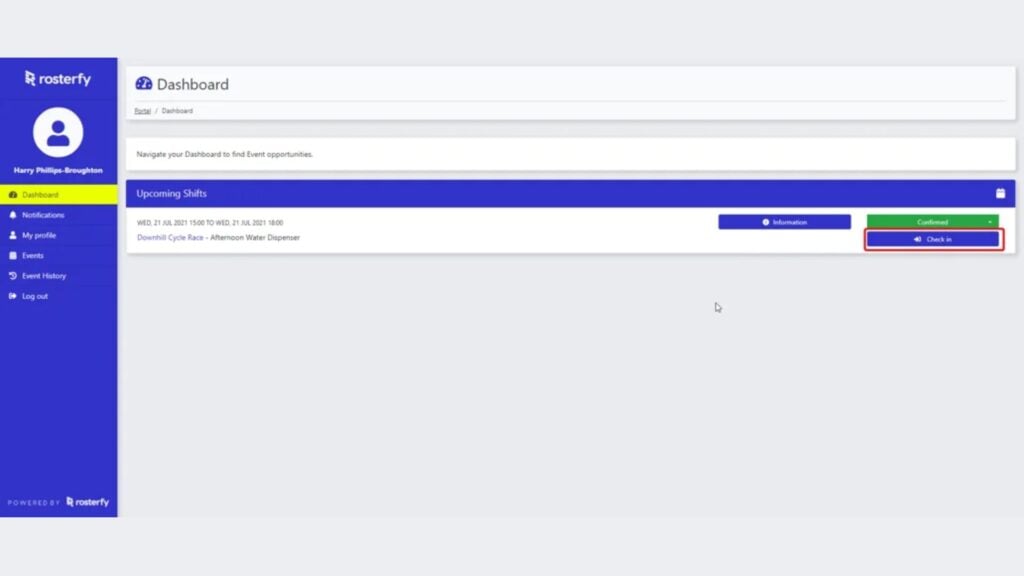
From Rosterfy’s short videos, the platform doesn’t look glitchy, though there can be loading lags when updating data. Concerningly, one Charity Connect user said that “three weeks before the event everything broke down” on Rosterfy. (The vendor didn’t comment on this thread.)
That said, features are highly customizable, from shifts to automations to volunteer forms, which is great for personalization and efficiency, but less ideal for usability. However, it seems that customizing tools, such as recurring schedules, is admin-heavy, involving unnecessary steps and clicks.
Having worked in nonprofits myself, I believe the average admin wouldn’t find Rosterfy’s customizations user-friendly. As one user put it:
“As someone who does not come from an IT and systems background, I found the ‘Show you’ and ‘Go Do’ model to be less effective for us.”
One thing I loved, though, is Rosterfy’s accessibility widget. You can use it both on the official website and in the admin and volunteer portals. Just click the accessibility icon and then customize tools, including contrast, saturation, dyslexia-friendly fonts, text size, and more.
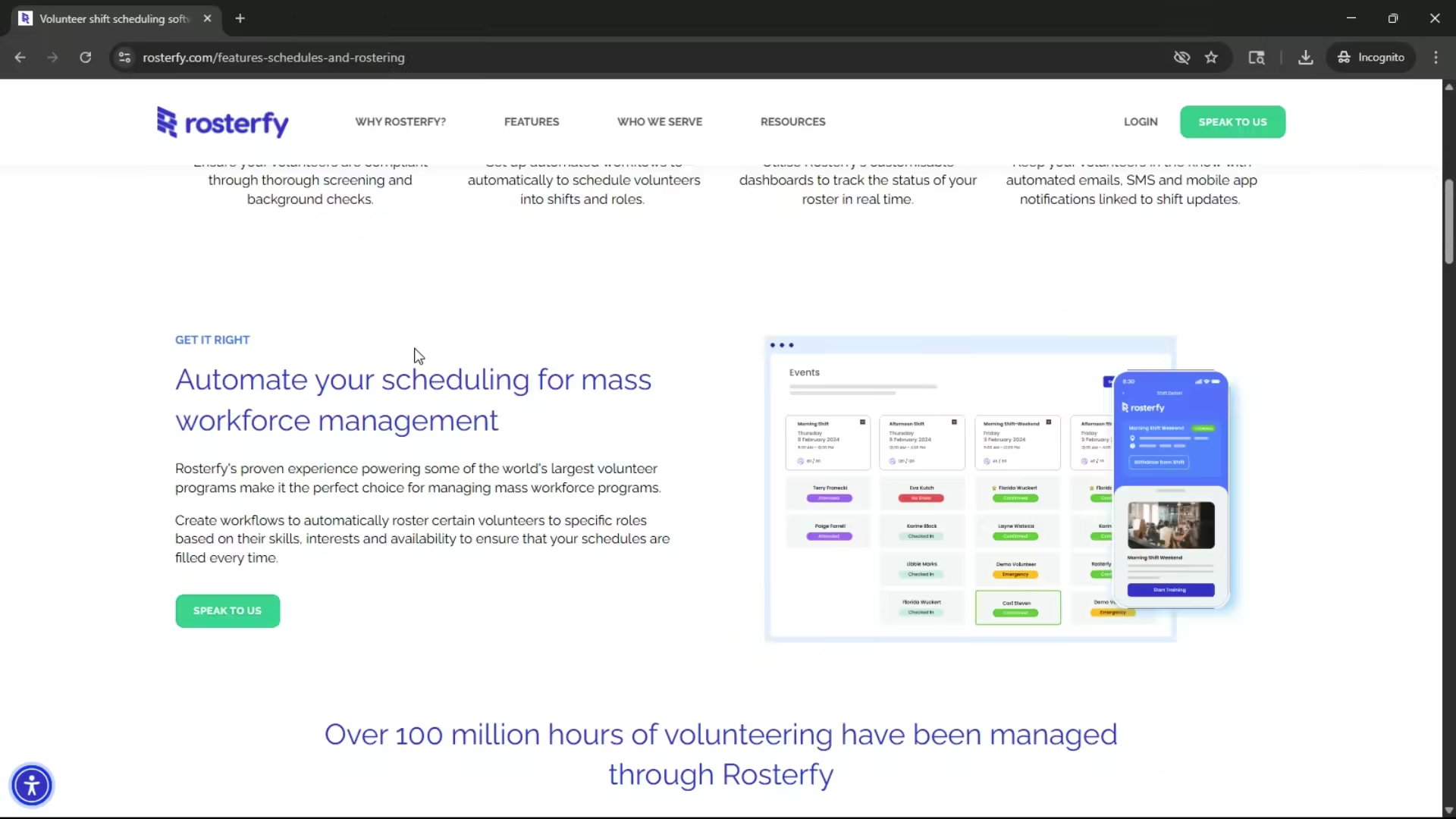
Verdict: 6/10
Mobile app
The Rosterfy mobile app is for volunteers only. That means you can’t update or assign shifts, approve timesheets, send comms, create forms, or view employee data via the app. I think this is massively inconvenient for admins or shift leaders in the field or away from their desks—for instance, when they’re at events or on their commute.
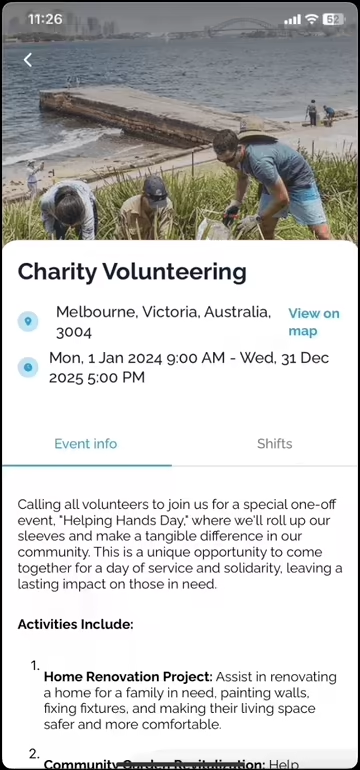
You also can’t view the team shift calendar, though I suppose you can get around this by adding yourself to all the shifts in a given location or team.
Volunteers, meanwhile, can:
- View and request shifts
- See shift details
- Register for events
- Complete custom forms
- Check in and out of shifts
- View and accept rewards
- View and react to news articles
| Menu Item | Admin | Employee | ||
| Web App | Mobile App | Web App | Mobile App | |
| Scheduling | ||||
| View team schedule | ✅ | ❌ | ✅ | ❌ |
| View and request shifts | ✅ | ✅ | ✅ | ✅ |
| Create shifts | ✅ | ❌ | ❌ | ❌ |
| Auto-schedule | ✅ | ❌ | ❌ | ❌ |
| Set availability | ✅ | ✅ | ✅ | ✅ |
| Time tracking | ||||
| Check in and out | ✅ | ✅ | ✅ | ✅ |
| View live attendance | ✅ | ❌ | ❌ | ❌ |
| Edit timesheets | ✅ | ❌ | ✅ | ❌ |
| Volunteer forms | ||||
| Create custom forms | ✅ | ❌ | ❌ | ❌ |
| Complete forms | ✅ | ✅ | ✅ | ✅ |
| Communication | ||||
| Send volunteer emails | ✅ | ❌ | ❌ | ❌ |
| Post news articles | ✅ | ❌ | ❌ | ❌ |
| View news articles | ✅ | ✅ | ✅ | ✅ |
| Training and rewards | ||||
| Complete training | ✅ | ✅ | ✅ | ✅ |
| Get rewards | ✅ | ✅ | ✅ | ✅ |
| User settings | ||||
| Customize notifications | ✅ | ✅ | ✅ | ✅ |
| Enable multi-factor authentication (MFA) | ✅ | ❌ | ✅ | ❌ |
Verdict: 5/10
Rosterfy Core Functionalities
Rosterfy scheduling
You can create fairly complex schedules in Rosterfy, though it involves a learning curve. I like that you can save shift templates and even bundle them into patterns—for example, a pattern might be a recurring pair of day and evening shifts.
You can format template descriptions using font size, alignment, and other tools, as well as set advanced settings, such as whether different elements (date, time, description) can be changed after publication.
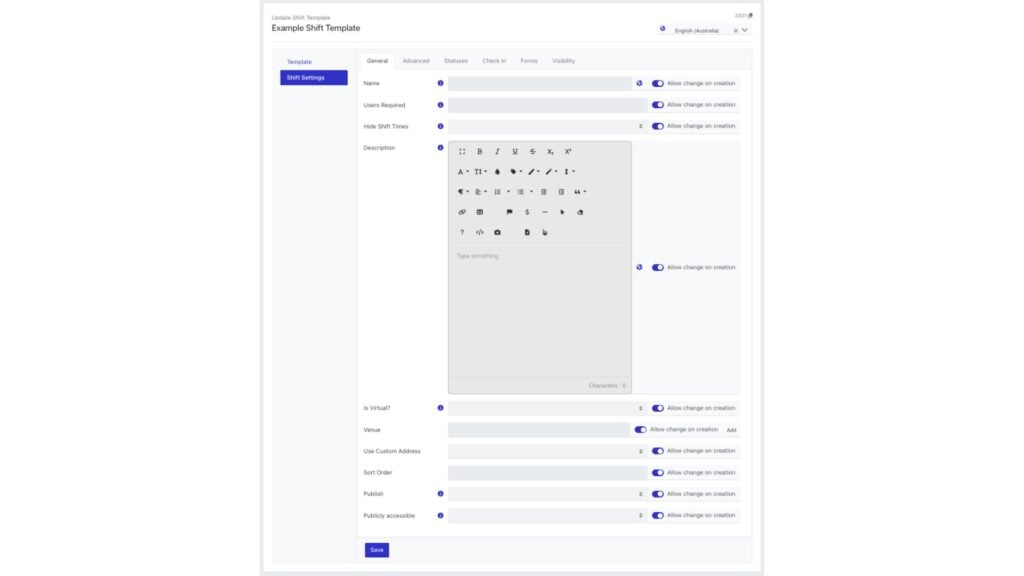
However, there are just too many clicks and screens required to create recurring schedules. Plus, it doesn’t seem possible to drag and drop shifts across volunteer schedules. Saying that, you can still reduce manual admin with automatic rostering, which is based on volunteer availability and other custom rules.
I found the volunteer shift calendar clear and intuitive. Users can switch between daily, weekly, and monthly views to see their shift details. They can withdraw from shifts and apply to open ones—but Rosterfy doesn’t enable shift swaps, which may increase admins’ workload.
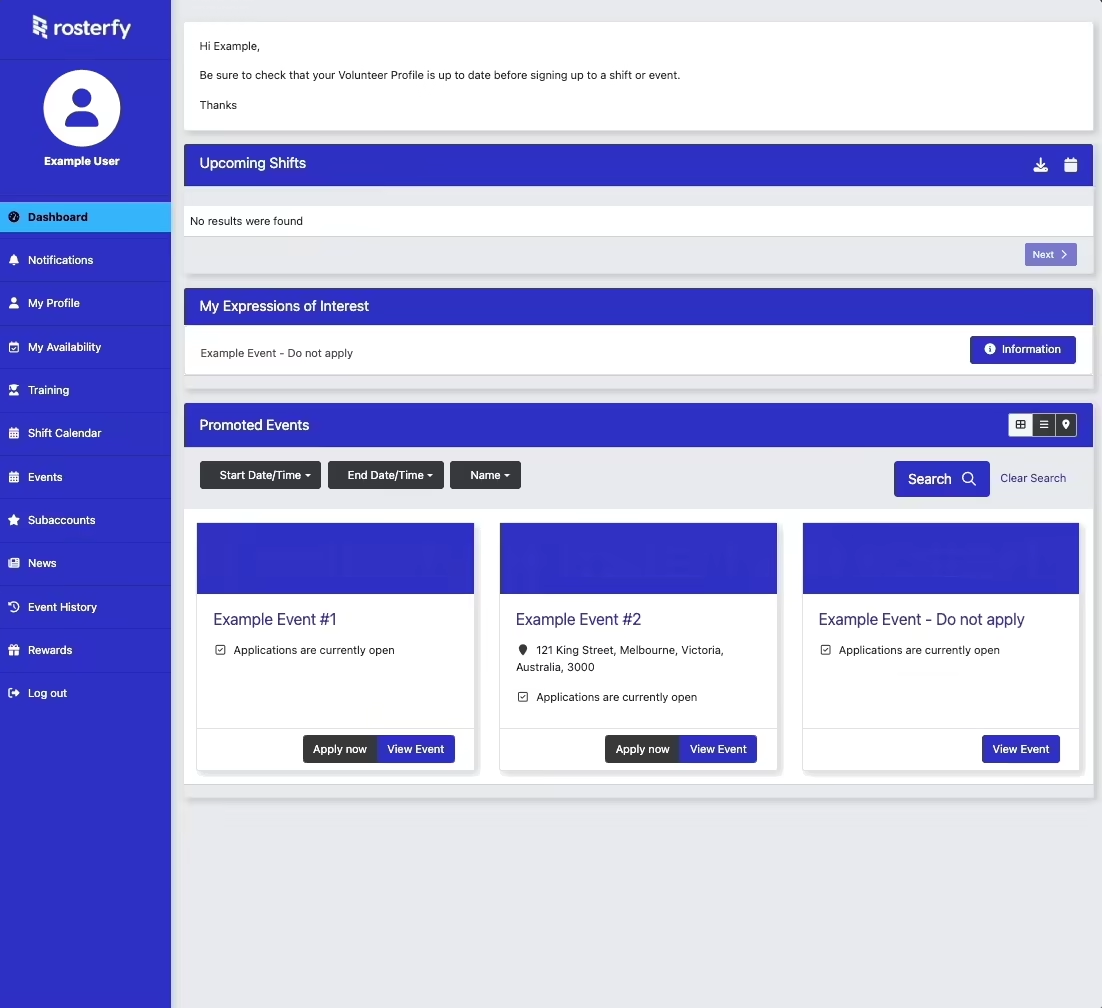
I like that volunteers can set their availability for specific or recurring dates. In the scheduling workflow, Rosterfy warns you when trying to book unavailable users.
Separately from shift scheduling, there’s an “Events” feature. Events can be public-facing (such as fundraisers) or internal (such as interviews).
Verdict: 8/10
Rosterfy time and attendance
Volunteers can check in to their shifts on any device—mobile, tablet, or desktop. I like that Rosterfy has a geofencing feature, which lets you specify an address and perimeter where users can clock in and out. You can set up alerts to remind volunteers to check in when entering these areas.
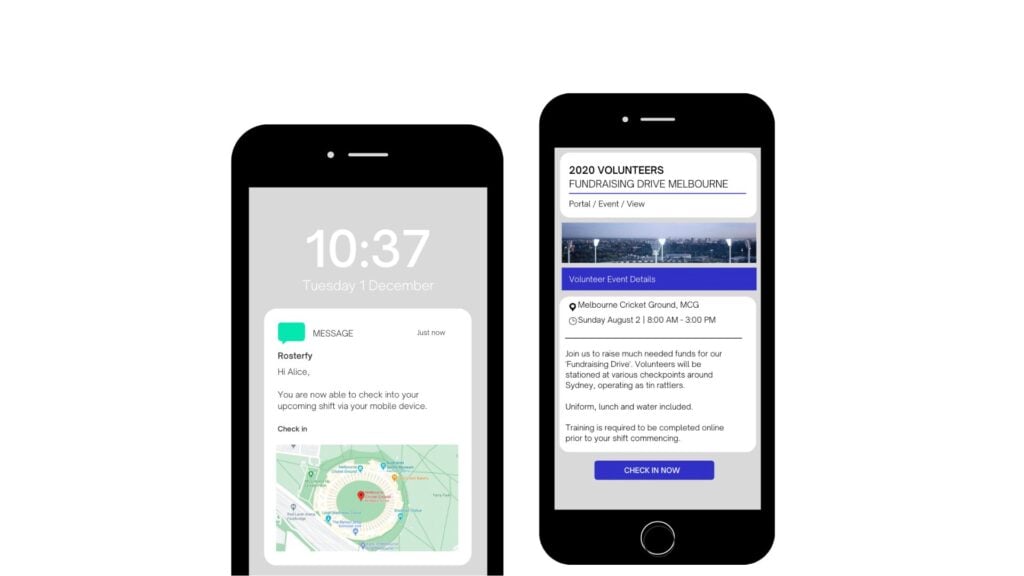
To log time, volunteers simply need to click the “check in” and “check out” buttons in the app. Users and managers can also create or edit time entries manually. However, there doesn’t appear to be a time clock tracking ongoing hours.
I also like that you can control when and how users check in. For instance, you can restrict check-ins completely on specific shifts or events, and allow check-ins a certain number of minutes before or after the shift start time.
Furthermore, timesheets are auto-generated from tracked and scheduled hours. The design here is old-fashioned, but at least you can bulk-update and approve multiple timesheets at once.
Although the platform caters to volunteer teams, you can set pay rates and send timesheets to payroll software. (It integrates with Deel, Microkeeper, PayReel, and MicrOpay only.) It’s quite robust—you can customize daily, hourly, overtime, and event-specific pay rates. You can even set rates for different days of the week and times of day, in multiple currencies.
Verdict: 6/10
Rosterfy volunteer forms
Create custom forms for volunteers to fill out, from post-shift feedback to event registration, training feedback, and more. You can also save and customize form templates, linking them to specific shifts, events, and training courses.
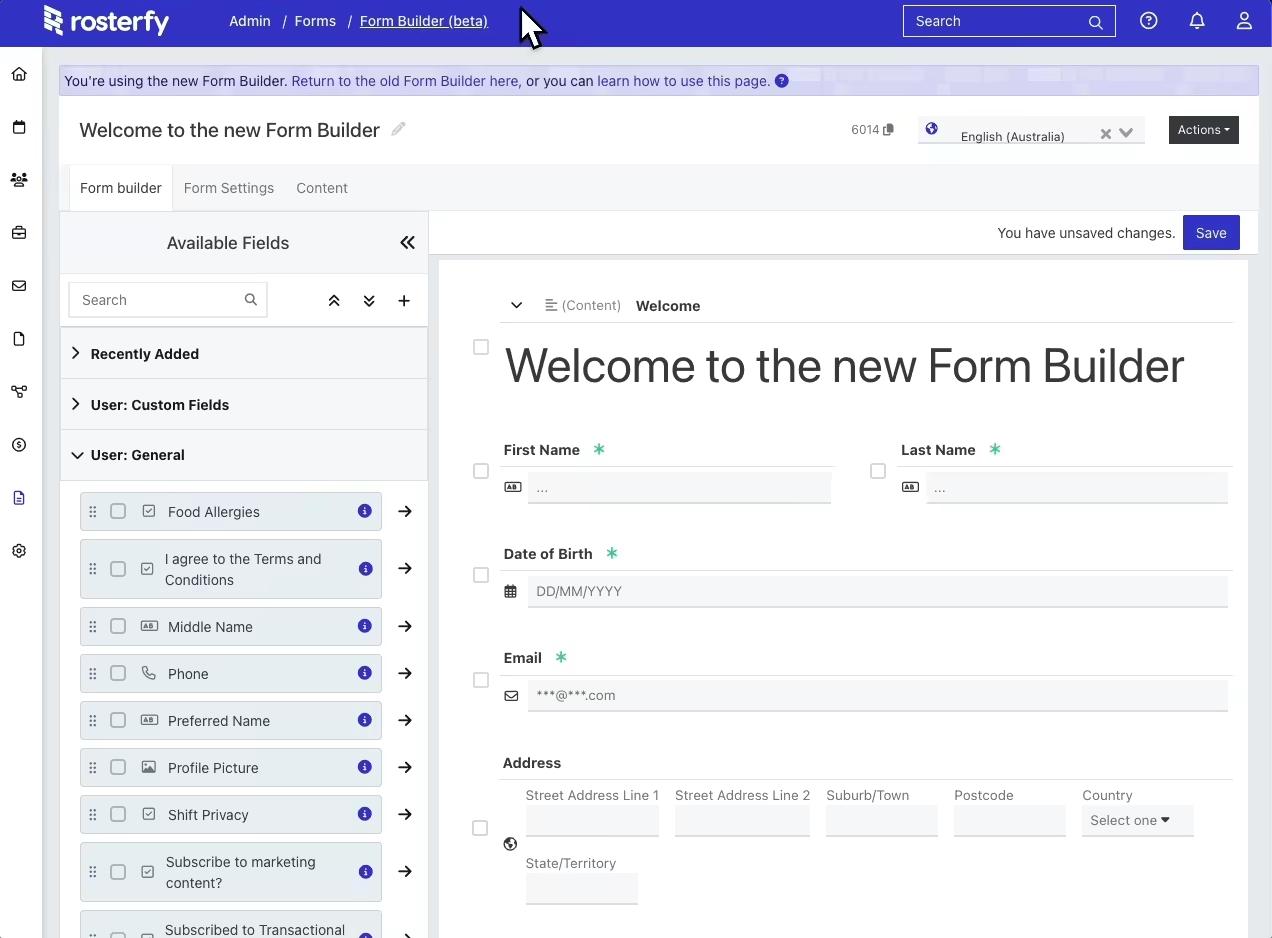
Compared to some of its other tools, I found Rosterfy’s forms to be easy to build and edit. Simply use drag and drop to add and reorganize fields in the form as well as quickly configure question types, including text, number, date, location, image, checklist, and multiple-choice. You can also add read-only text, such as instructions.
Two advanced form tools caught my eye. First, you can create custom fields for shifts, users, and other relevant data, and reuse them across forms. This saves you from typing up new fields in every form. Second, you can customize question visibility rules—for example, a “dietary requirements” field will only show up if volunteers respond “Yes” to “Do you require a meal?”
Verdict: 8/10
Rosterfy communication
Rosterfy enables volunteer communication through a combination of email automation, news articles, notifications, and a contact center.
The automated email feature reminds me of an email marketing platform. Essentially, you create templates—for welcoming new volunteers, or providing shift or event info—and select the volunteer group and scheduled timing (including recurring and trigger-based blasts).
For example, using Rosterfy’s automation settings, you could trigger post-shift feedback emails once managers approve timesheets.
I like that you can brand your email templates (for example, adding on-brand banners and color patterns). Also, mail merge tags such as <First name> help you personalize mass emails with useful details—not just volunteer names, but also shift dates, outstanding training, and more.
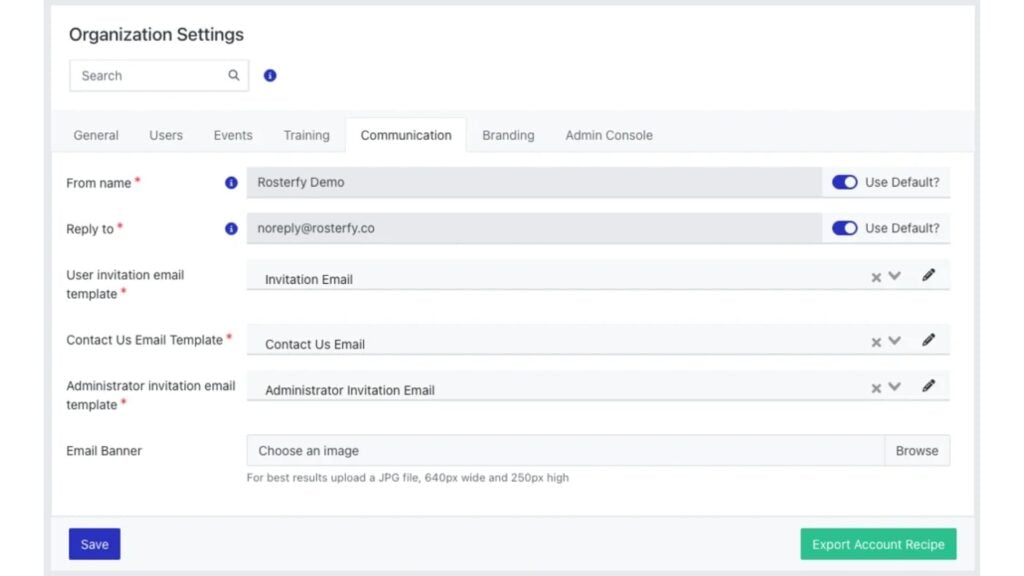
Crucially, there’s two-way communication. Volunteers can respond to your designated reply-to email address. Plus, you can set up different contact center email addresses to better filter volunteer queries—for example, [email protected].
However, the absence of a real-time chat feature means urgent messages could get overlooked.
Verdict: 7/10
Rosterfy volunteer management
Rosterfy’s volunteer management features include a volunteer database, built-in training modules, onboarding, and rewards and recognition. Together, they help increase volunteer retention and reduce recruitment costs.
You can track and update personal details, skills, training, and more. You can also filter your volunteer database by custom groups and locations. Plus, I like that you can bulk import users (from .CSV files or other software, such as Salesforce).
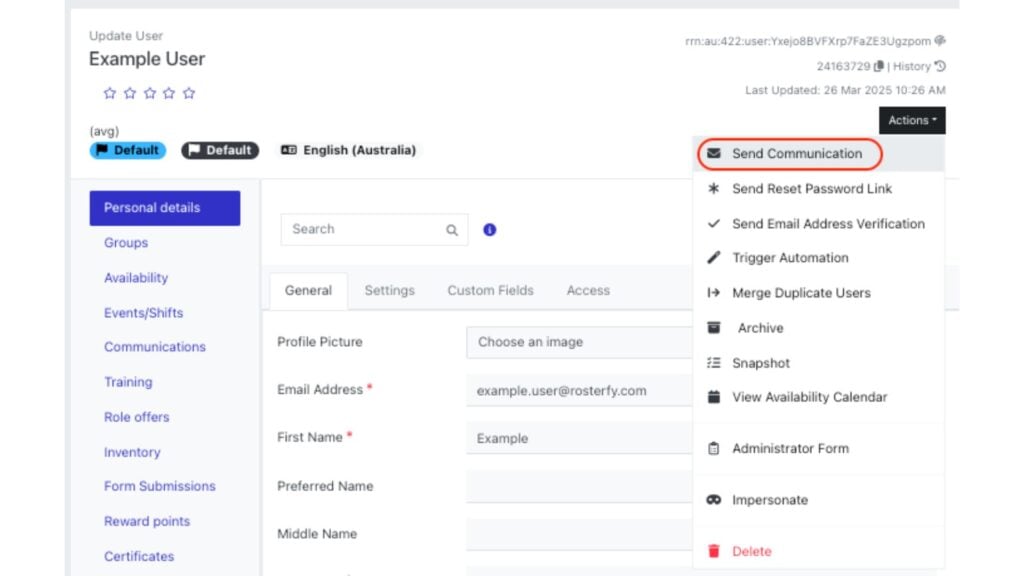
In individual profiles, you can view communication history, current and past shifts, and training progress, and take quick actions, including:
- Send an email
- Assign a new shift or edit current shifts
- Update check-in and check-out times
- Assign training
- Add or remove from groups
Rosterfy also lets you generate volunteer certificates based on the training, events, or rewards that users engage with. However, I’m disappointed that you can’t track external certifications and qualifications, along with expiry dates, such as driver’s licenses.
That said, you can use Rosterfy’s powerful automation rules to stay compliant. For example, if volunteers don’t complete specific training, the software can revoke their access to groups, shifts, or events.
Verdict: 6.5/10
Rosterfy Security Features
Rosterfy is ISO 27001 and SOC 2 certified, which is an industry standard. It also uses at-rest and in-transit encryption, including Transport Layer Security (TLS). Other security methods include firewalls, virtual private cloud (VPC), IP address and port filtering, and third-party penetration testing.
Rosterfy complies with the General Data Protection Regulation (GDPR) in the European Union and the Data Protection Act in the United Kingdom. However, it isn’t Health Insurance Portability and Accountability Act (HIPAA) compliant in the United States.
Users can enable multi-factor authentication (MFA) and single sign-on, as well as customize data access and privacy settings. For instance, you can set visibility and editing permissions for admin, manager, and regular users across schedule creation, setting pay rates, and viewing reports.
Plus, volunteers can hide their own data, such as their names, on multi-person shifts. You can also manually encrypt sensitive user fields (like food allergies).
Verdict: 9/10
Rosterfy Reporting & Analytics
From its reporting help articles, Rosterfy’s analytics suite is seemingly quite extensive and action-oriented. You get a set of standard, ready-to-download reports including user availability, shift attributes, all users, and training attributes.
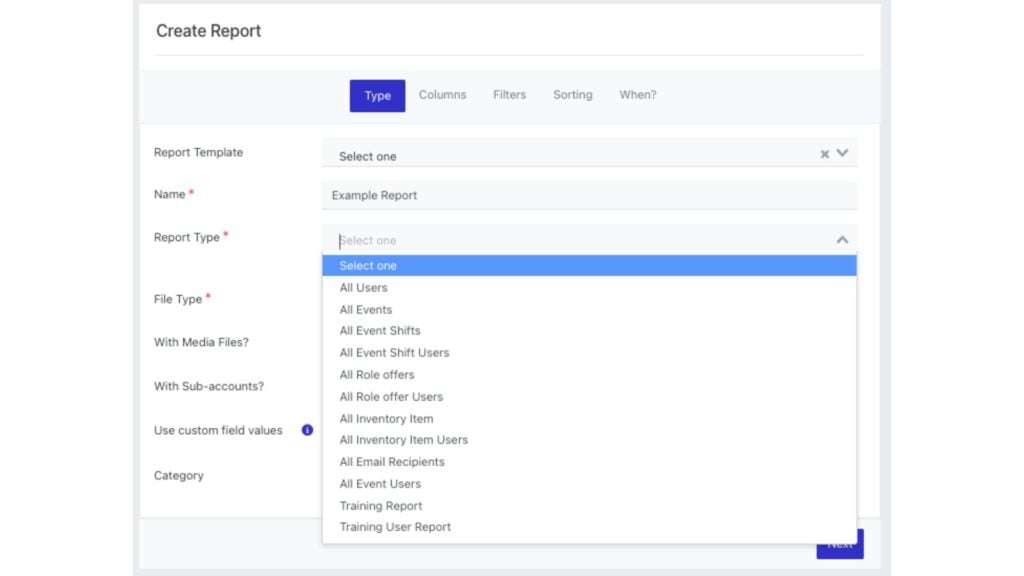
Crucially, you can also customize advanced reports and save these as reusable templates. Simply start with Rosterfy’s standard report templates or create one from scratch. I like that you can include data from virtually all Rosterfy modules, including schedules, volunteer hours, user demographics, email open rates, form fields, and rewards.
You can add rules to your custom reports or filter your data by sub-categories, such as user groups, shift types, locations, and more.
Now, I’m not impressed with the custom report usability. It’s a bit too old-school and manual. For example, you must scroll through a huge dropdown and click “Add column” every time you add data types to your report. A search bar and clicking the variable name would have done the trick.
Also, you must tap “Regenerate” to view up-to-date data in custom reports. This means reports don’t show real-time data, which, for busy charity admins, could spell mayhem if they forget to click that button.
A verified user said that reporting is not “as intuitive and user-friendly as the rest of the program.” So it’s not just me, then.
However, Rosterfy lets you schedule custom reports for specific days and times, and with specific frequencies, such as daily or monthly. You can also instantly share a report in Rosterfy with team members. Alternatively, export by .CSV or .PDF.
Verdict: 7/10
Rosterfy Customer Support
The only way to chat with Rosterfy staff (without an account) is by requesting a demo. I did this, got an email reply the same day, and scheduled a call the next day using a “book a time with me” link. On the call, the rep was friendly but didn’t provide much information beyond pricing. Strangely, I was denied a demo about a week later.
There’s no live chat, phone, or email support while you’re in the consideration stage. Sadly, I can’t comment on the usefulness of the live demo.
Meanwhile, as a paying customer, you get email-based support, with response times depending on priority levels. For example, you get replies to low-priority issues within 5 business days and complete resolution within 90 days.
Reviews of its customer support have been mixed, but mostly positive. Some praise its “friendly support team,” but I’ve also read that “getting engagement in a timely manner had proven challenging.”
There’s an in-depth help center covering user management, scheduling, communication, reporting, and more. It could be much easier to navigate, though. I appreciate that Rosterfy publishes monthly product updates covering design, functionality, and bug fixes.
Verdict: 6/10
What Are Rosterfy’s Review Ratings from Review Sites?
(As of September 2025)
Capterra: 4.5/5
G2: 4.4/5
Software Advice: 4.5/5
TrustRadius: No product page
GetApp: 4.5/5
Google Play Store: No ratings yet
Apple App Store: 3/5
Rosterfy App Review
Rosterfy is an excellent scheduling and volunteer management app for large nonprofits. Sure, it could do with a more modern user experience and simpler ways to set up tools like scheduling and reporting. There’s also the inconvenience of not having access to any admin features on mobile.
But for teams of 500 volunteers and over, it’s cost-effective and feature-rich. I loved the advanced customizations and the number of available automations, as well as the fact that it integrates with payroll software. Smaller nonprofits need alternative schedulers that don’t break the bank, though.
Connecteam: The Better Rosterfy Alternative
Connecteam is an all-in-one time management solution that lets you schedule, reward, and communicate with volunteers. It’s way more affordable than Rosterfy for smaller nonprofit teams while offering some extra benefits.
Here are the top differences.
Scheduling
I tried Connecteam’s staff scheduling, and it’s super beginner-friendly. You create recurring shifts in a few clicks, and can drag and drop slots across days and teams. I especially love that you can auto-fill open shifts based on volunteer availability and qualifications.
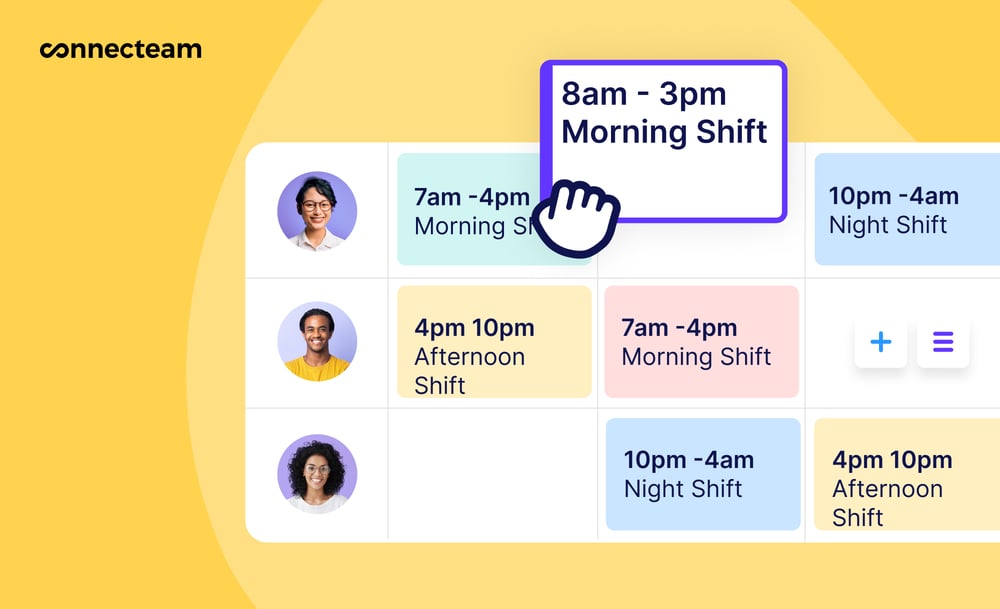
Unlike Rosterfy, Connecteam lets you track different types of leave, including Paid Time Off (PTO), on top of availability. Also, you can add custom tasks, digital forms, and checklists to shifts, whereas Rosterfy only features forms.
Time tracking
Volunteers can clock in and out with one click, and managers can quickly approve timesheets for payroll. You can send timesheets to popular payroll providers, including Gusto, Paychex, QuickBooks, and ADP.
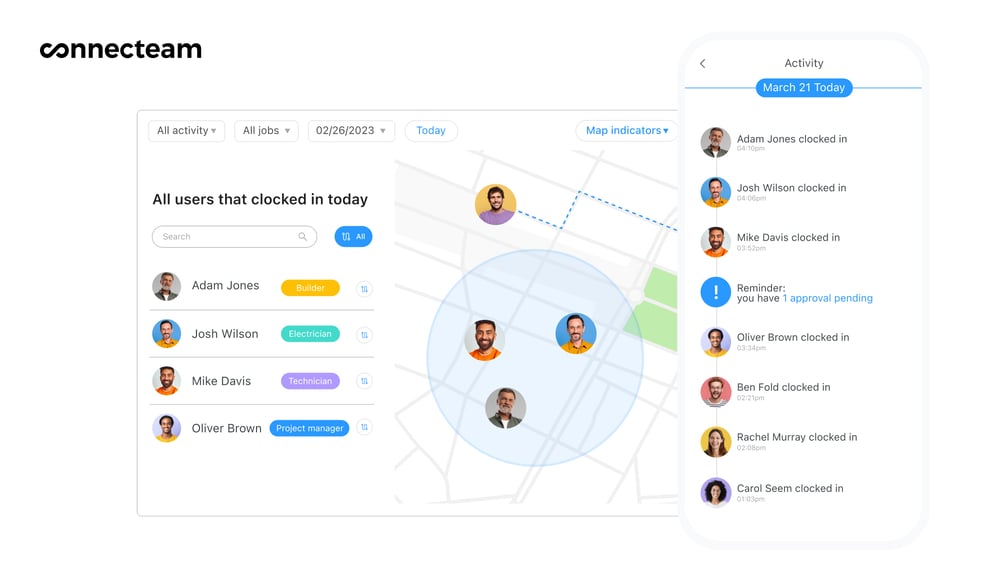
Besides using the geofence time clock, you can also track volunteers’ live GPS location (while time tracking only) to make sure everyone’s in the right place.
Team chat
I love Connecteam’s online team chat. You can message anyone in your team 1-on-1, create private groups (such as shift-specific ones), share images, videos, and voice notes. Admins can also broadcast team-wide announcements.
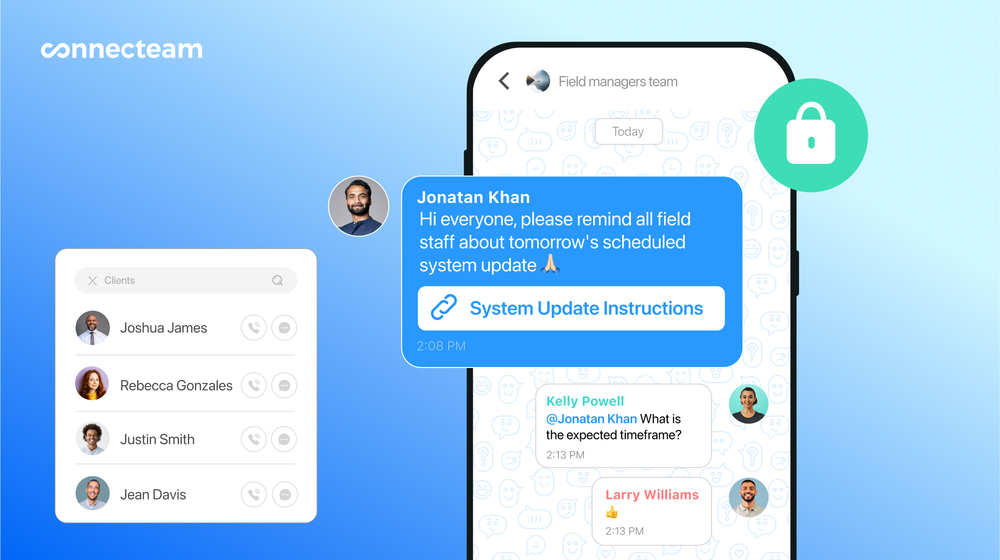
Mobile app
The Connecteam mobile app lets you schedule and edit shifts, view live attendance, approve shift requests, timesheets, and time off. This enables admins and team leads to manage volunteers whenever they’re away from their desks. It’s also more user-friendly than Rosterfy’s volunteer-only app.
For all these and many other features (including training, rewards, and a volunteer knowledge base), Connecteam is completely free for up to 10 team members. Pricing starts at just $29/month for 30 users.
FAQs
Does Rosterfy offer a free trial?
No, Rosterfy doesn’t offer a free trial, but you can schedule a live demo with its team.
Is Rosterfy HIPAA compliant?
No, Rosterfy is not HIPAA compliant, so healthcare nonprofits can’t use it to store protected health information (PHI).
